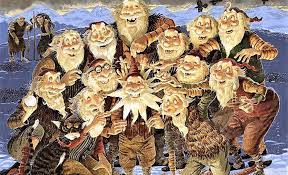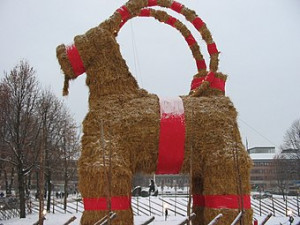
Από την μαθήτρια Παρασκευή Μακρή, Β4
We have many tried-and-true Christmas traditions in the United States: decorating your Christmas tree, baking holiday cookies, and opening Christmas presents, to name a few. Some more modern traditions include watching Christmas movies and keeping up with The Elf on the Shelf. But some of the ways Christmas is celebrated around the world might surprise you. Once you learn about what happens in other countries, you may even want to start some of these traditions into your own home. And others, you might want to skip! How about waking to find rotten potatoes left in your shoes by a mischievous Father Christmas? Or Kentucky Fried Chicken for your Christmas dinner? Believe it or not, those are actual Christmas traditions around the
world. From Christmas by the beach with fresh seafood in New Zealand, to hot porridge that keeps families warm during the cold Finland winter, you’ll discover just how different these global holiday traditions are. What’s more, we think you’ll wow your family during your Christmas party with all of the following
interesting Christmas trivia.
Sweden
 The Yule Goat has been a Swedish Christmas symbol dating back
The Yule Goat has been a Swedish Christmas symbol dating back
to ancient pagan festivals. However, in 1966, the tradition got a
whole new life after someone came up with the idea to make a
giant straw goat, now referred to as the Gävle Goat. According to
the official website, the goat is more than 42 feet high, 23 feet wide,
and weighs 3.6 tons. Each year, the massive goat is constructed in the same spot. Fans can even watch a livestream from the first Sunday of Advent until after the New Year when it’s taken down.
Philippines
 If you thought the United States went all out with Christmas
If you thought the United States went all out with Christmas
decorations, you should see what the Philippines does. Every year,
the city of San Fernando holds Ligligan Parul (or Giant Lantern
Festival) featuring dazzling parols (lanterns) that symbolize the
Star of Bethlehem. Each parol consists of thousands of spinning
lights that illuminate the night sky. The festival has made San
Fernando the "Christmas Capital of the Philippines."
Japan
Although Christmas isn’t a national holiday in Japan (an estimated
one percent of the population is Christian, according
to Smithsonian Magazine), its citizens still find an interesting and
delicious way to celebrate. Rather than gathering around the table
for a turkey dinner, families head out to their local Kentucky Fried
Chicken. The tradition began in 1974 after a wildly successful
marketing campaign called Kurisumasu ni wa kentakkii! or
Kentucky for Christmas! The fast food chain has maintained its
yuletide popularity, causing some people to order their boxes
months in advance or stand in two-hour-long lines to get their
finge good food.
Similar to the 12 days of Christmas in the U.S., Iceland celebrates
13. Each night before Christmas, Icelandic children are visited by
the 13 Yule Lads. After placing their shoes by the window, the little ones will head upstairs to bed. In the morning, they’ll either have received candy (if they’re good) or be greeted with shoes full of rotten potatoes if they’re bad. And you thought coal was a terrible gift!
Finland
On Christmas morning, Finish families traditionally eat a porridge
made of rice and milk topped with cinnamon, milk, or butter.
Whoever finds the almond placed inside one of the puddings
wins—but some families cheat and hide a few almonds so the
kids don’t get upset. At the end of the day, it is customary to warm
up in a sauna together.
Because summer falls during Christmas time for Kiwis, a number of
their traditions center around a barbie, or grill, where families and
friends gather for a casual cookout of fresh seafood, meat, and
seasonal vegetables. The New Zealand Christmas tree is the
Pohutukawa, a coastal species that blooms a bright-red color in
December, providing shade during the sunny days as they sing
carols in both English and Maori.
Before Christianity came to the Danes, Christmas Day was a
celebration of brighter days, jól, as it occurred just before winter
solstice. Today, homes are decorated with superstitious characters
called nisser who are believed to provide protection. On the
evening of December 24, Danish families place their Christmas
tree in the middle of the room and dance around it while singing
carols.
Martinique
In the French Caribbean island of Martinique, la ribote is a
longstanding tradition where families visit their neighbors during
Advent and on New Year’s Day bearing holiday food like
yams, boudin créole, pâtés salés, and pork stew. They sing
Christmas carols together into the early hours of the morning,
adding their own creole verses to traditional lyrics.
Norway
In Norway, the Christmas season, called julebord, begins Dec. 3,
filling up local bars and restaurants throughout the month.
Families celebrate Little Christmas on Dec. 23; each have their own
ritual for the day that may include decorating the tree, making a
gingerbread house, and eating risengrynsgrøt (hot rice pudding).
Ireland
The Irish leave a tall red candle in a front window overnight, a
welcoming symbol of warmth and shelter for the holiday season.
Traditional Christmas fare in Ireland often includes homemade
roast goose, vegetables, cranberries, and potatoes.
Barbados
 A Christmas table in Barbados isn’t complete without a baked ham
A Christmas table in Barbados isn’t complete without a baked ham
decorated with pineapple and sorrel glazes, a rum cake, and Jug
Jug, a dish inspired by the Scottish influence on the island
combining pigeon peas, guinea corn flour, herbs, and salt meat.
Poland
On Christmas Eve in Poland, many families share oplatek (an
unleavened religious wafer), each person breaking off a piece as
they wish each other Merry Christmas. Dinner may not begin until
the first star appears in the night sky and, traditionally, an extra
setting is left at the table should someone show up uninvited.
The Netherlands
Sinterklaas is the Dutch name for Saint Nicholas, the man
recognized by children by his long white beard, red cape, and red
miter. Kids put a shoe by the chimney or back door and wake up on
Christmas morning to find treats like gingerbread men, marzipan,
and chocolate letters inside.
Portugal and Brazil
Brazilian and Portuguese families come together on Christmas Eve
to eat dinner as late as 10 p.m. Then, at exactly midnight, they
exchanges gifts, toasts, and wish each other a Merry Christmas.
Midnight mass, Missa Do Galo (Rooster Mass), is a chance to meet
up with neighbors and extended family to wish them well for the
holiday season. The service is often followed by fireworks in the
town square. Pictured: Cathedral Square in Mariana, Minas
Gerais, Brazil
Austria
Alpine countries like Austria have a legend that a devil-like
creature called Krampus joins their St. Nicholas festivities on
December 6. Children are asked for a list of their good and bad
deeds: Good children are rewarded with sweets, apples, and nuts,
and bad children worry what Krampus might bring on Christmas
morning.
South Africa
While the traditions around South Africa vary by region and
culture, most families come together for a cookout,
called braaing on the holiday. Marinated steaks and boerewors
sausages serve as the main course, followed by a customary dessert
of malva pudding (pictured) served with a custard. Traditional fir
Christmas trees are decorated with a variety of baubles included
hand-beaded African ornaments.
Ukraine
Orthodox Christians make up nearly 49 percent of Ukraine’s
population; they observe Christmas Day on January 7 by dressing
in traditional garments and walking through town singing carols. A
dish called kutya, made of cooked wheat mixed with honey,
ground poppy seeds, and sometimes nuts, is a popular Christmas
Eve treat. Some families throw a spoonful of kutya at the ceiling: If
it sticks, there will be a good harvest in the new year.
All across Mexico members of the Church put on Pastorelas
(Shepherd’s Plays) to retell the Christmas story. The Mexican
Christmas season begins early in December with Las Posadas, a religious march that re-enacts the journey of Mary and Joseph. The vibrant red poinsettia flowers are also used in holiday arrangements for decoration throughout the country. Pictured: a traditional Christmas and New Year parade in Chilpancingo, Guerrero state, Mexico
Switzerland
Swiss families make their own advent calendars for the holiday
season. These calendars are either given to children as a surprise or
made together as a fun activity. Each day’s bag reveals a new
surprise or treat, with the biggest gift on Christmas Eve.
El Salvador
Central American countries like El Salvador toast Christmas with
fireworks displays on December 24 and 25. Children celebrate with
smaller firecrackers called volcancitos (little volcanos)
and estrellitas (little stars) while those who are a little older tend to
prefer the larger varieties and Roman candles. Pictured: A
Christmas tree in front of the National Palace at the historic
center of San Salvador, El Salvador.




